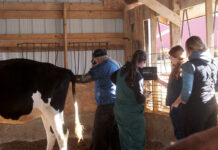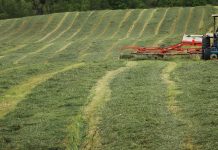I was recently at a birthday party for a dear relative of mine. As I do, I got to talking with some people I’d never met about things we had in common, people we both know, etc.
It came up that I help run my husband’s family farm, where we raise beef cattle and sheep, all for meat. An older gentleman, someone’s uncle, asked me casually what it costs now for a cut and wrap on a beef. I told him our price ($3.95 per pound plus processing, by the way), and he was scandalized by the price.
“I used to get it for $1.99 per pound,” Someone’s Uncle said.
“Yeah, our prices used to be less, too,” I said. “But we’re comparable with farms in the area.”
If Someone’s Uncle wanted to know, I could have explained to him why our prices have increased in the last decade.
A big part of it is all the things we dealt with in transitioning management of the farm from my husband’s grandfather to my in-laws, my husband and myself. It’s a weird mix of issues, but they include Pappap Wagoner’s prices being too low to begin with. We were basically giving away our animals (and all the labor and feed and care that went into them) because he did not see the farm as a business and, therefore, did not treat it as such. We slowly increased the price to be competitive with farms around us without alienating existing customers to hit a price that would be profitable for us.
The other big piece of this is the prices of various inputs have increased over the years. One tangible example that sticks out in my mind is 2022, the year that Russia invaded Ukraine and the prices of fertilizer and fuel were sky-high.
This was also the year we picked up leased ground for the first time and put in 20 acres of new hay fields. Things were tight with needing to buy seed and fertilizer (something we don’t normally do).
As a cost-saving measure, we chose not to work the ground over as much as we normally would. We did it just good enough to get things planted. Now, two years later, when I run the skid loader over that field to load hay bales onto the trailer, my kidneys take a beating as I go over all the bumps we didn’t flatten out. And I think fondly about the year fuel prices were crazy high. But we made the best decision we could given the circumstances at the time.
Anyway, none of that happened because Someone’s Uncle didn’t want to know why prices of beef increased by talking to an actual farmer and agricultural journalist who had both lived experience and a ton of background knowledge to explain the context. Turns out he already knew the answer.
“I don’t want to get into politics, but we all know why that is …” Someone’s Uncle said, conspiratorially.
“Uh huh …” I replied, trying not to roll my eyes.
It was at this point that I was happily interrupted by my 3-year-old daughter who needed my attention more than this random dude I’d just met.
• • •
I hate talking politics. Sure, I could have heard Someone’s Uncle out, but I’m not sure I needed to. When the word “politics” gets mentioned, it’s a sure sign that the person you are speaking with does not want to have a discussion anymore. They want to foist their opinions on you, and hopefully, you agree with them or things are going to get awkward pretty quick.
I know the high cost of food was a big talking point during the most recent presidential election. The cost of all other groceries has been killing me, too. The president is an easy scapegoat, but not all things are tied directly to who is in the Oval Office.
For example, if Someone’s Uncle wanted to talk about the price of eggs, I would have been happy to talk about why prices are so high right now. It has a lot to do with the H5N1 bird flu that’s been hanging around the U.S. since February 2022. This virus has resulted in the deaths of more than 110 million domestic birds and has now spilled over into dairy cows.
Speaking of dairy cows, why does a gallon of milk cost so much? If I had a dollar for every time I’ve heard some iteration of the saying “only five people know how milk is priced in the U.S. — and four of them are dead,” then I could comfortably retire tomorrow.
Milk pricing is confusing because of weird regulatory things. But it is also complex, like basically everything on the earth, and includes many factors like feed prices, milk production levels, export demand, cull cow prices and so on.
Are some of these factors linked to who is president at the moment? Sure, but correlation does not imply causation.
Earlier on that same night, I was again talking about the farm to two brothers. The one brother’s in-laws traditionally eat lamb for Christmas, so we were chatting about lamb, which I sell.
The other brother asked if we butcher our animals ourselves at the farm. I told him no we don’t because we can’t. “That’s the short answer,” I said. “There’s a long one if you want to hear it.”
The brothers said they did. So I launched into an explanation about the wonky state and federal regulations around red meat processing, the reasons why they exist and how that impacts me as a small farmer. They asked the appropriate follow-up questions, we made some jokes and it was a nice conversation.
Were they truly interested? I’m not sure. Maybe they were just being polite. Perhaps the fact that we all had beers in hand standing around a fire helped keep the conversation going.
Either way, I left the encounter feeling good or at least neutral. I didn’t have that weird pit in my stomach like I do when someone hijacks what was a pleasant interaction to impose their close-minded worldview on me.
• • •
I’m not sure what the lesson is here. Maybe I should just stop talking to strangers. That would simplify my life significantly. It would take me less time at the grocery store or trying to leave social gatherings.
I don’t think that’s it, though. I think we all need to approach conversations with an open mind or not at all. If you don’t go in honestly and openly, we’re missing out on opportunities to connect with one another, to share information, to gain perspective.
“In true dialogue, both sides are willing to change,” the Buddhist monk Thich Nhat Hanh wrote in his book, “Living Buddha, Living Christ.”
That’s the quote that has been shared thousands of times on quote websites across the internet. The whole passage is even more enlightening, though.
Nhat Hanh continues: “We have to appreciate that truth can be received from outside of — not only within — our own group. If we do not believe that, entering into dialogue would be a waste of time. If we think we monopolize the truth and we still organize a dialogue, it is not authentic. We have to believe that by engaging in dialogue with another person, we have the possibility of making a change within ourselves, that we can become deeper.”
It’s part of my job to talk to strangers. There are the ones I seek out when reporting on a story, but also the ones that come to me as editor. I field the angry calls, emails and letters from readers (Yes, it’s true. Some people don’t like everything we print in the Farm and Dairy and they are not afraid to let The Editor know about it.)
I try not to be defensive, although it’s hard when someone is attacking a product I’m extremely proud to produce each week. I don’t even agree with everything we put in the paper, but that’s the whole point. It’s not about me.
When talking to unhappy readers, I make it a point to put myself aside and hear them out. Hell, that’s half the problem. People just want someone else to hear them. I try to get them to hear me out, too. There are reasons why we publish everything in the paper. Can we make improvements? Certainly. Am I going to stop running Alan Guebert’s column? Nope. I like to end phone calls on a good note somehow or at least a neutral one.
Don’t get me wrong. I’m not saying you should walk on eggshells when talking to people. But I also don’t think you should deliberately go around trying to stir the pot. Who does that benefit?
More often than not, you probably have things in common with people around you. We all basically want the same things in life: food, water, comfort, stability, salty snacks, love and to not talk about politics with strangers.













